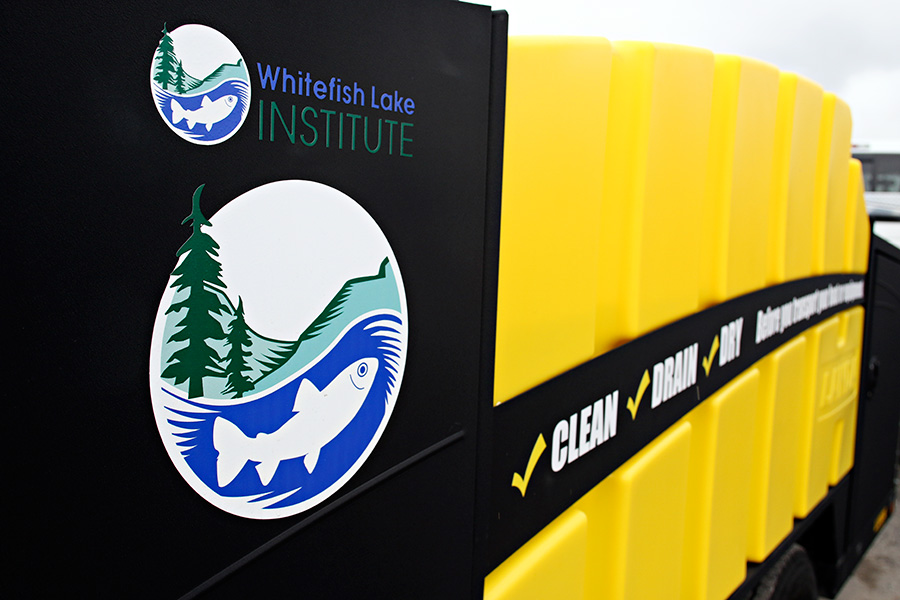Whitefish Firms up Partnership with State on Local AIS Stations
Inspection and decontamination stations are fully online for Whitefish Lake boat launches
By Tristan Scott
After taking steps to fortify Whitefish Lake against the threat of aquatic invasive species, the Whitefish City Council has subtly tweaked its local inspection operations to comport with the same regulations and training protocol employed by Montana Fish, Wildlife and Parks.
Although the changes are subtle, they include dissolving a requirement that boaters pay a decontamination fee when an inspection-station staff member deems the boat a high enough risk.
Since Memorial Day, both the city of Whitefish and the Whitefish Lake Institute have been working in concert to staff a pair of city-funded check stations at the two primary public boat launches on Whitefish Lake — Whitefish City Beach and Whitefish Lake State Park — as well as a decontamination station at Whitefish Marine and Powersports on U.S. Highway 93.
According to Mike Koopal, executive director of the nonprofit Whitefish Lake Institute, the decontamination station was used to clean a mussel-fouled boat from Michigan after it was flagged at an inspection station on the Blackfeet Indian Reservation, but has not been fully functional due to a dispute over funding with Montana Fish, Wildlife and Parks.
“Ultimately we capitulated on the user fee and decided to seek out a different source of funding to keep the decontamination station alive,” Koopal said. “We are accepting voluntary donations from boaters who wish to contribute.”
In finalizing its response to aquatic invasive species, and in particular to the pressing threat of invasive quagga and zebra mussels, Whitefish leaders unanimously passed an ordinance aligning the city’s training protocols with the state’s, setting up a tagging system for boaters who only launch on Whitefish Lake and laying out a system for the city and state to communicate and share data.
“We have always contemplated entering into some sort of agreement with the state to allow us to perform inspections,” Whitefish City Attorney Angela Jacobs said. “After many, many months we think we have something that is going to be agreeable.”
The Whitefish City Council in March approved spending nearly $140,000 on the plan, noting the havoc an infestation could wreak on the region ecologically and economically.
Both locally and statewide, efforts to reduce the risk of aquatic invasive species spreading through Montana’s water bodies have been stepped up in response to the positive detection last fall of invasive mussel larvae east of the Continental Divide in Tiber Reservoir, as well as their suspected presence in Canyon Ferry Reservoir and the Missouri River near Townsend.
So far, the traces of contamination are restricted to the Missouri River Basin, but the likelihood persists of mussels hitchhiking on the hulls of boats or in bilge water or cloistered away in irrigation equipment. The threat of mussel infestation hits especially close to home for those working to protect the waters of Flathead Lake and its surrounding network of rivers and creeks, and it comes to rest at the doorstep of the Columbia River Basin — the only major watershed in the West still believed to be free of quagga and zebra mussels.
The urgency of the threat is what prompted the city of Whitefish to partner with the Whitefish Lake Institute and Montana State Parks to craft a plan aimed at building a perimeter of mandatory inspection stations around Whitefish Lake, which, compared to other lakes radiating with access points, is relatively easy to contain.
Running through the end of September, a mandatory watercraft inspection station will offer extended hours at Whitefish City Beach while a separate city-run watercraft inspection station will operate at Whitefish Lake State Park. Meanwhile, a decontamination station will operate at Whitefish Marine and Powersports on U.S. Highway 93, while the boat ramps will also be controlled after hours.
The inspection station at Whitefish City Beach will operate from 5 a.m. to 9 p.m. in May, August and September, and from 5 a.m. to 10 p.m. in June and July. At Whitefish Lake State Park, the inspection station will operate from 7 a.m. to 10 p.m.
Anyone carrying or towing any motorized or non-motorized watercraft must stop at all watercraft inspection stations, and all watercraft must be inspected prior to launching in Whitefish Lake.
Decontamination is necessary whenever a boat is launching in Whitefish Lake with ballast tanks or bags; has been in a mussel-infested waterway in the past 30 days; has standing water; or inspectors deem it too dirty to inspect.